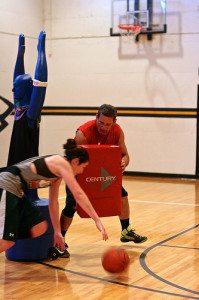Creating a Talent Pipeline within your Program
Talent within any program is always a point of focus. Whether it is through recruiting the right pieces of the puzzle or developing those that talent within a program that already exist. No program can afford not to have talented athletes within their ranks and expect to have lasting success. Recruiting is seen by many people as the easy way out for programs with significant resources, they can just buy in the required skill sets missing. However, for those programs not rich in these resources then development is the only option. The irony is though, if a program is successful through implementing a policy of development, it will find that players, coaches, officials and administrators all gravitate to its door so they too can be part of the success.
Harnessing talent to create a pipeline through a program’s various facets is not an easy task. There are a number of different and very specific elements that need to all be put into place for the development cycle to take hold and then continue to enrich the players that move through its process.

Philosophy
Before anything else can be developed there must be a defining of the purpose of the program. This involves describing the desired outcomes and the strategies put in place to achieve these. Adding details to the technical, tactical, physiological, and psychological standards that are wanted within the program and bench marked for ongoing development is vital.
Involved in the description of the philosophy of a program will be interwoven planning around how the program is to be conducted, resources available and overall guidelines (budget, facilities, age groups, competitions, etc.) on how the program will operate.
Getting the philosophy around the purpose of a program and how talent is to be shaped and developed is very important right from the start. While not set in stone, things can always be changed, but the variation in philosophy is one of the reasons people often leave programs or the good progress stalls. This can cause conflict and end up pulling a program apart. Commitment to a philosophy while undertaking evolution, rather and revolution, is important vision to developing the right culture for an evergreen program.
Coaching
The most influential parts of developing talent is found within the cornerstone of coaching. Having knowledgeable coaches within a program allow every player to advance.
Another aspect of coaching will be to have the right number of coaches to meet the needs of a program. While most programs will if their honest, state they will never have enough coaches, usually they can get by as long as everyone is pulling in the same direction.
A point of confusion when discussing coaching is that the coaches all have to be of the highest level. This is not the case. While having experience is very important, it is not the exclusive quality that a program requires of its coaches to be successful. Other attributes associated with a programs collective coaching ranks include consistency in philosophy, commitment to the development theme and a willingness to commit time to the process. These attributes can be found in an individual, but can exist and still provide benefit when shared amongst the core group of coaches within a program. An inexperienced or apprentice coach should not be seen as a weakness within a program, but an opportunity to harness energy and intensity to help spur on the talent development. When partnered with a mentor, a junior coach can make significant gains because of their willingness to learn and adapt.
Facilities
A key point will be looking at the facilities currently available to a program. From this point, additional needs be identified and addressed. In some cases where there is a shortage of space for trainings there might a need for two teams to share a court, or for a team to have one training session inside and another outside so every team is able to train at least once a week indoors.
Not having access to good or facilities of standard is not the end to the development of talent. What is does mean is the coaches working within this system must be flexible and adaptive in finding ways around this problem. Changing training times to suit court availability, travelling to suitable venues, fundraising for equipment are all some of the strategies which may need to be employed.
Support Services
Gone are the times of sport being purely focused on the court. Now with advancements in sports sciences, medicine and psychology there are numerous support services which play a part in the development and maintenance of talent. To help develop talent there must be a rounded approach as stated earlier to not only sports specific skills such as technical and tactical, but also the development of the physiological and psychological aspects of the player.
Spreading the load across aspects and varying athlete contact across these services also help engage and keep players focused on achieving their goals more readily. Consistent messages delivered from multiple sources help authentic the importance of the development process to the talented individual.
A talent pipeline is not a given just because all the pieces fit together neatly. Time will still need to be given for players to develop and a program to take hold within the sporting community and the programs individual context. Developing talent requires not just success, but successive successes that when added together lead to a good culture for a program, and good habits for an athlete. Overnight success is never overnight, and many successful programs that we can all see around us have usually been developed through the lifelong commitment of various individuals. Individuals that came in early and left late for years and years…




